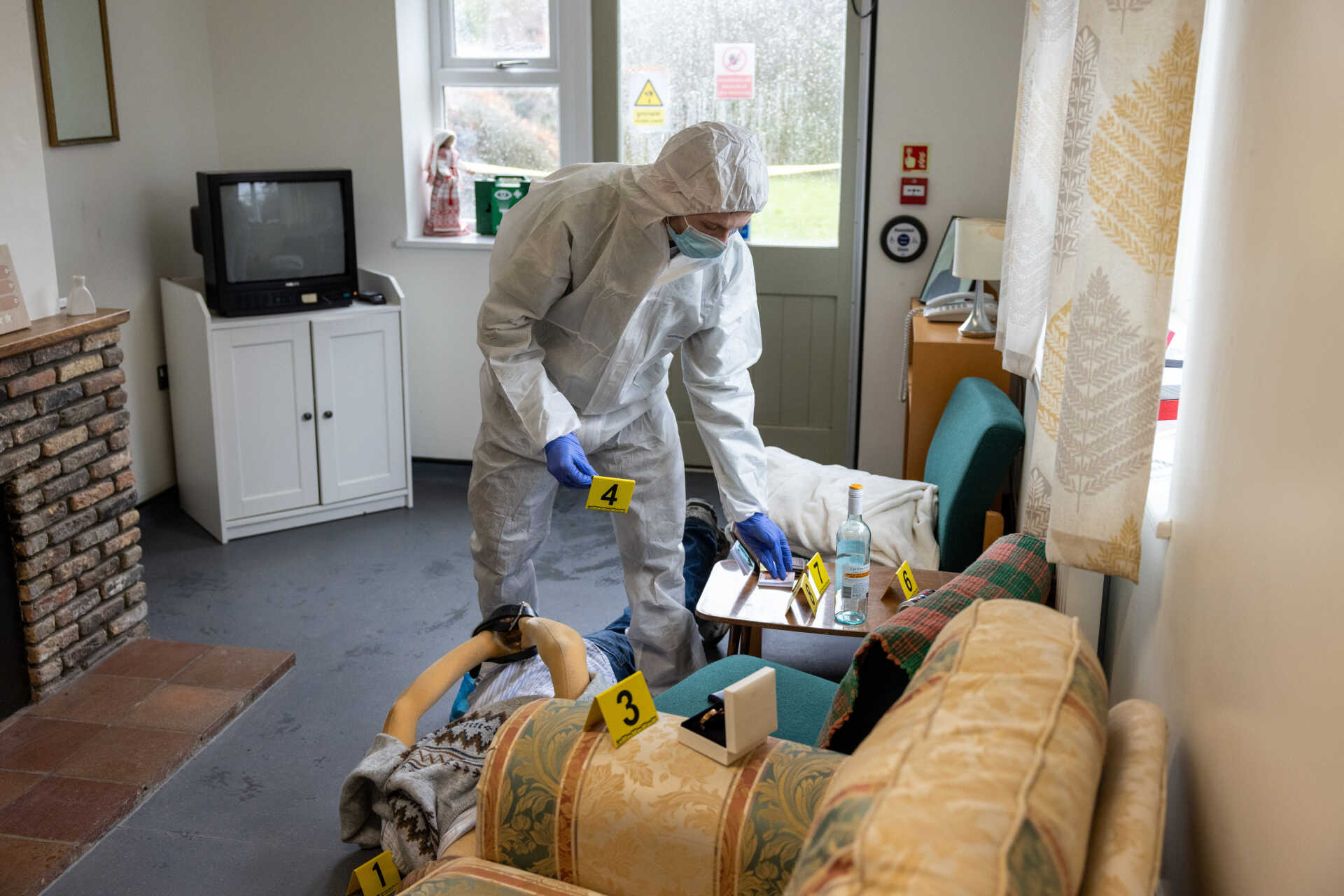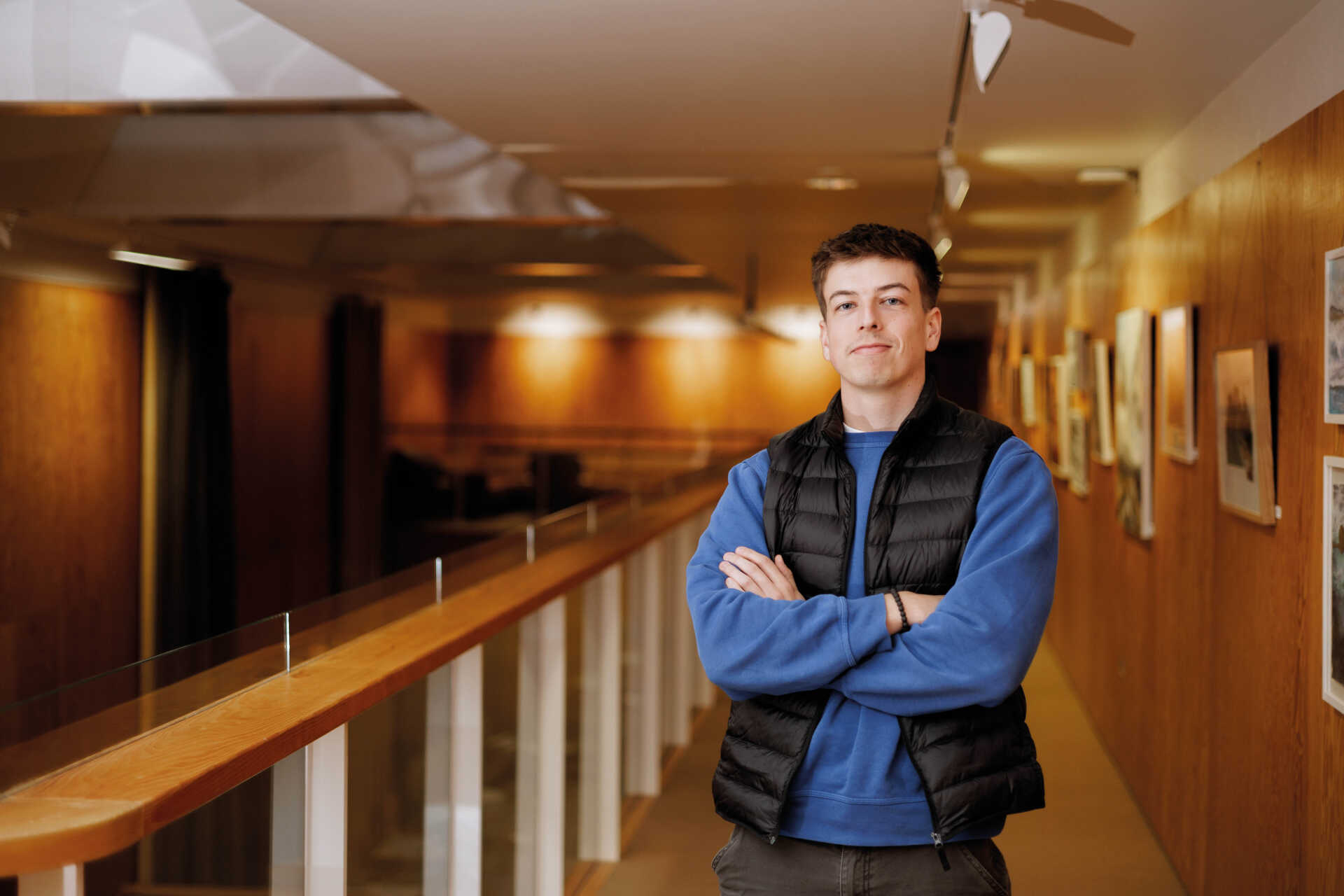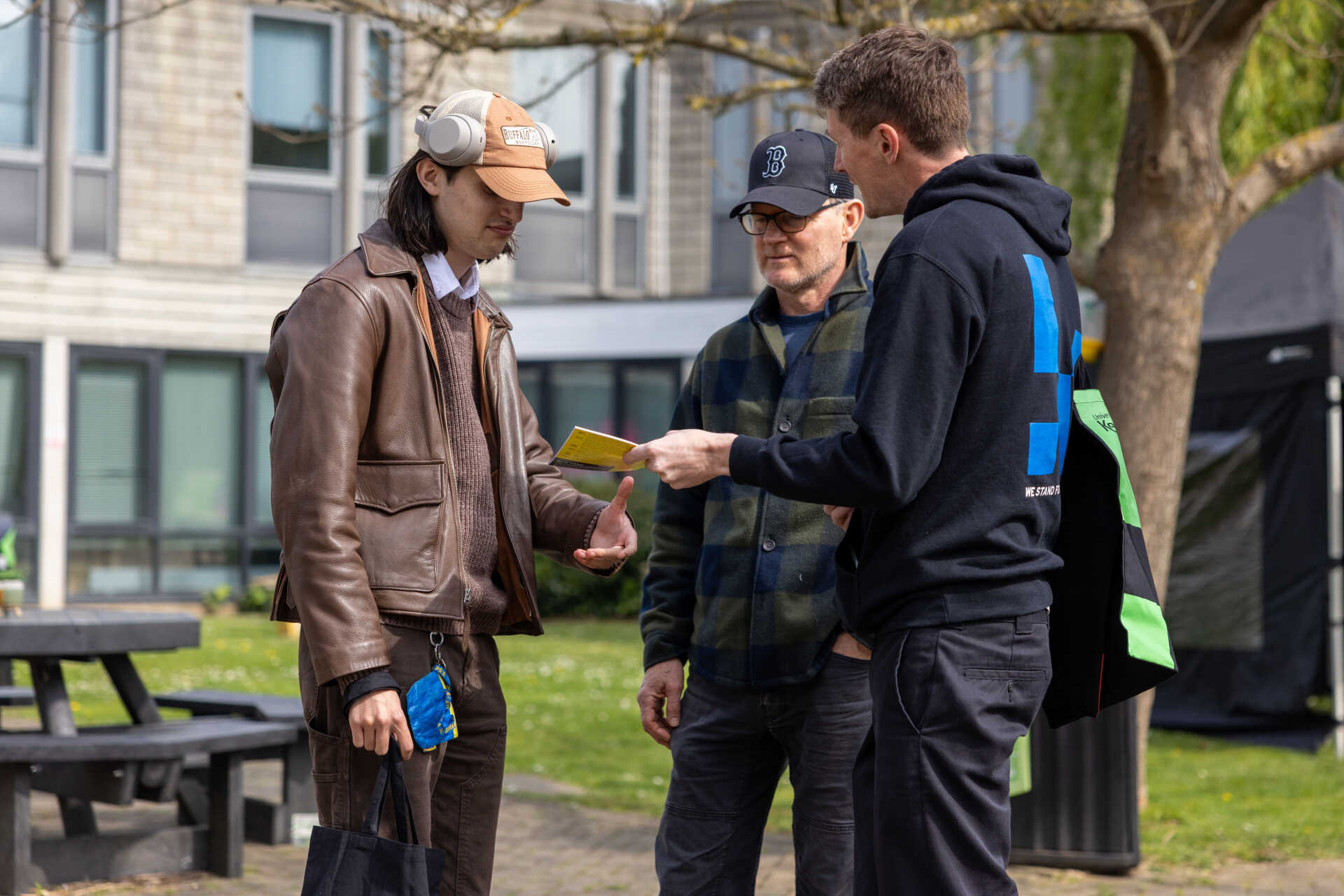Forensic Science
Uncover evidence and understand the science behind crime.
Key information

Uncover evidence and understand the science behind crime.

Clearing made easy.
Apply now or call – it only takes a few minutes to secure your spot.
Clearing made easy.
Apply now or call – it only takes a few minutes to secure your spot.
Discover how science plays a vital role in solving crimes and delivering justice.
You’ll study areas such as trace evidence, ballistics, and DNA analysis. Alongside this, you’ll train in delivering expert witness testimony and explore the legal and ethical dimensions of your work.
Our course stands out for its unique facilities and hands-on approach. You’ll investigate simulated crime scenes in our dedicated house and vehicles, practise techniques in specialist labs, and access cutting-edge equipment including our VisionX Comparison Microscope.
With options to take a year in industry, study abroad, or complete an integrated Master’s, you’ll graduate with the scientific and analytical skills to thrive in careers from policing and counter-terrorism to public health and research.
The following modules are what students typically study, but this may change year to year in response to new developments and innovations.
Compulsory modules currently include the following
Embark on a fascinating journey into the heart of matter with our Fundamentals of Chemistry module, designed to ignite your curiosity and lay the foundations for your understanding of the chemical world. Delve into the fundamental principles that govern the behaviour of atoms and molecules, explore the mysteries of chemical reactions, and investigate the endless possibilities that chemistry offers in shaping our world. From understanding atomic structure to unraveling the complexities of bonding and reactivity, this course serves as a vital gateway, equipping you with indispensable knowledge essential for both forensic analysis and broader chemistry applications.
Why do we make molecules? Why does nature make molecules? What do these molecules do? What makes carbon so vital to life? What makes one molecule a medicine and another a poison? You'll start your journey in organic chemistry by answering some of these questions.
We'll introduce you to the basics of fundamental organic chemistry, looking at the structures of carbon-based molecules and how they can be put together in millions of different ways. We'll see how they bond with other elements to give complex compounds and how they can be made, synthetically and biologically. This module equips you with all you need to know about organic chemistry leading into your later studies in Chemistry or Forensic Science, laying the foundations for your degree and your career.
What is a crime scene? What happens at a crime scene? What is forensic science and what role does it play in legal proceedings? In this module, you'll explore how scientific techniques are utilised and applied to gathering and analysing evidence in criminal investigations.
Gain an insight into how a range of scientific disciplines can be used to uncover mysteries and bring justice to light. You'll consider numerous types of evidence that make up the 'toolkit' of a forensic scientist, and their evidential value. You'll develop an understanding of the role that forensic scientists play in crime scene investigation, the legal process, and crime scene management. Finally, you'll apply best practice to a series of fascinating case studies - gaining a core understanding of the importance of forensic science and the significance it holds in the administration and serving of justice.
What happens when someone pulls the trigger? How do bullets remain stable during flight? What makes one bullet more lethal than another?
In this module you'll look at how ammunition is constructed, how different classes of firearm function and develop skills in fundamental maths and physics that underpin basic bullet trajectories and impact phenomena. You'll develop a strong understanding in the fundamental principles upon which the field of ballistics relies and begin to apply this knowledge to forensic scenarios involving firearms to uncover truths and trace evidence to solve questions.
Inorganic and physical chemistry play a key role in underpinning broad areas of the forensic and analytical sciences, including identification of unknown substances, key biological processes and the chemical analysis of trace evidence. This module provides you with an understanding of the core range of inorganic and physical chemistry that underpins forensic analysis, including the states, stability and reactivity of matter and the patterns amongst the elements across the periodic table that are responsible for properties such as colour. You'll also be equipped with the key mathematical concepts necessary to understand and solve problems in these areas of chemistry and apply this to forensic science to uncover secrets, solve cases and answer questions.
Knowing how to approach a crime scene is imperative for all forensic practitioners to maintain integrity and ensure the delivery of justice. You'll will develop the toolkit of core practical skills that are employed to process an incident scene and prepare for crime scene investigation. Alongside this, you'll work through a range of exciting laboratory sessions to teach you the fundamental chemical techniques that a forensic scientist needs to excel in all areas of the profession, from chemical synthesis to forensic chemical analysis.
Through hands-on practical sessions, you'll learn the core techniques needed to collect evidence, and begin to develop the problem solving skills needed to identify, interpret and evaluate several evidence types, including firearms ammunition and fingermarks. Following this, you'll learn how to map out a crime scene, search a series of varied crime scenes and learn the best practices for documenting and acquiring photographs. This practical skill set is crucial for you making further progress in your degree, and later, your career.
Compulsory modules currently include the following
Why is analytical chemistry important within the chemical and forensic industries? What approaches should we take when considering the chemical analysis of an unknown sample? Analytical chemistry is essential throughout the chemical and forensic world - covering not only how we design experiments to understand the composition of unknown samples, but also how we confirm and quantify results and assign a level of confidence to our findings. This module takes a pragmatic, application-driven approach to sample preparation, analysis, and data validation, providing key foundations for the modern analytical chemist - and the key skills needed for a number of careers in chemical and forensic industries.
Do you want to know more about the structure of DNA and how its structure has evolved to provide the building blocks of life? Have you wondered why different drugs behave in different ways inside our bodies? How do we create new treatments and therapies to tackle disease? This module introduces you to the key ideas and fundamental molecular components of biochemistry. You'll look at simple biomolecules and non-covalent interactions, building up to biological oligomers before you are introduced to key concepts in pharmacology and pharmacokinetics, illustrated with medicinal chemistry case studies. This application of theory into practice through examining case studies prepares you for a career where you can get hands-on and make a real difference.
As a forensic scientist, what would you do if someone comes across buried human remains? How do we collect evidence from a scene, document it and ensure we maintain a clear legal chain of custody? Why should we care about this? This module will develop your appreciation of a range of physical techniques applied to the collection of bulk and trace evidence materials in forensic science.
You'll look deeply into aspects of physical evidence, practical issues of item examination, legal process and general procedures associated with the collection and submission of a range of forensically-relevant materials. You'll also look at the processes that underpin the recovery of buried remains and how you being to analyse these to build a biological profile. This provides you with a broad understanding of scene and evidence processing to take forward into a future roles in practical forensic science.
What happens when the police seize computers during an investigation? How do we use cutting edge technologies to identify criminals? This module introduces you to a broad range of established, and emerging, computer based forensic methods that involve consideration of key digital forensic techniques, use of facial identification, and the construction of facial composites (eFITs) to aid criminal investigations.
Your awareness of modern digital image processing and photo forensics investigation methods will be developed during this module. You'll develop the ability to appreciate and engage with the current digital revolution and its appropriate application in policing and forensic investigation.
How do we investigate a shooting? What happens when someone gets shot? Why do different human tissues react differently under different impact conditions?
You'll be introduced to a wide range of experimental and theoretical processes that may be undertaken in aid of understanding what happened in a shooting incident. You'll also develop a deep understanding of the science that underpins high energy trauma and how scientists measure and interpret this to draw valid forensic conclusions in the specialist field of wound ballistics. The field of ballistics is used as a shining example of the importance of interdisciplinarity and the role this plays in modern forensic science.
The careful and considered collection of evidence from an incident scene along with the accurate and robust analysis of this evidence are the cornerstone of forensic science. But how do you decide upon the best ways to collect evidence, and which techniques to use, to assemble the best case with the evidence you have?
In this practical and laboratory based module, you'll develop advanced scene investigation and evidence collection skills before applying previously developed core chemical and forensic practical skills to broader and more real-life investigative scenarios. This involves consideration ballistic, digital and chemical evidence, using new and complementary analytical tools, techniques and instrumentation. You'll also gain valuable experience in concisely summarising and reporting multiple types of data in styles appropriate to different disciplines within forensic science.

You have the option to add a year in industry to this course. We already know you have the confidence and commitment to thrive in the workplace and kick-start your career. This is your chance to prove it, to yourself and to employers.
When should I start looking? Companies will recruit at different times of the year based on their size. It's good to be application ready by the summer of your first year.
Where can I get help finding a placement? Book an appointment with a placement adviser via the careers service.
Will I get paid? Most of our placements are paid.
Do I have to pay tuition fees? Yes, you’ll pay a substantially reduced fee. Fees for the current year (subject to changes) can be found on our tuition fees website.
Where can I get visa advice if I’m an international student? Kent Students' Union can help with any visa queries.
Does the University keep in touch? You receive four-weekly check-in emails, a visit from the team every three months and you can reach out to us any time by email or phone.
Do I work for a full year? The minimum requirement for an industrial placement is 44 weeks.
What could you do in a year?
Taking a year abroad – whether you study at one of our prestigious partner universities or do an internship – is an amazing opportunity.
Is there any additional funding for the year abroad? You may be able to apply for funding; check with our Go abroad team.
Do I have to pay tuition fees for the year abroad? Yes, you’ll pay a substantially reduced fee. Fees for the current year (subject to changes) can be found on our tuition fees website. You don’t pay anything to the host uni.
Will I still get my maintenance loan? Yes.
When does the year abroad take place? Between your second and final year.
Do I have to learn a foreign language? You’re taught in English in many destinations, but you’ll get more out of your year if you learn the local language.
Does the University keep in touch? You have full access to all Kent’s support services as well as our dedicated Go abroad team.
Where could you go in a year?Compulsory modules currently include the following
Modern Chemistry and Forensic Science rely heavily on a suite of chromatographic and spectroscopic techniques. But which of these should we apply for our particular cutting-edge chemical research, or to obtain the specific, precise and robust forensic evidence we require?
This module builds upon your knowledge of fundamental concepts and methods to understand the specificity, advantages and limitations of these more advanced techniques, and explore approaches to best apply them across a broad range of applications. Using this knowledge, you'll strategically choose and expertly apply advanced analytical methods across a range of scenarios explored elsewhere within your course.
Beyond this course, you can apply these interdisciplinary skills and technologies to pioneering research and in support of impacting real world issues in fields including environmental chemistry, forensic trace analysis and pharmaceutical development and detection.
What properties of a material define its value as trace evidence? How can we use this understanding to shape our approach to collecting and analysing these evidence types?
Understanding trace evidence is of fundamental importance to Forensic Science, providing links between people and locations or objects. In this advanced module you will delve into the analytical techniques and chemical principles critical for examining trace materials. From fibres and hair to glass fragments and makeup, you'll uncover the stories hidden in the smallest samples. Through discussion of real-world case studies and studying cutting edge approaches to analysing complex and inconsistent samples, you'll build the expertise to enable you to interpret this vital evidence type.
What causes a fire to rage out of control? What makes an explosion so destructive? How do we gather and analyse evidence we normally rely upon from a scene that may have been compromised by a powerful blaze or destructive explosion?
This advanced module develops your understanding of the chemical and physical processes that drive fires and explosions. You'll learn how to identify accelerants, detonators and types of explosives, reconstruct fire scenes and develop insights as to the nature of fires and explosions, allowing you to formulate expert opinions based on your findings. You’ll also learn about how best to apply specialist analytical techniques for the analysis of fire and explosive evidence.
Forensic science and DNA have been inseparable topics for decades, but what role does DNA play in forensic science? You'll look at the structure of DNA and the powerful techniques we use to analyse this important evidence type within a forensic context. You'll gain a critical understanding of practical considerations in genetic analysis, the challenges associated with results interpretation and how best to report on complex samples. You'll not only gain mastery of DNA analysis techniques but also investigate profound insights into their application in the captivating field of forensic science, all while exploring the intriguing ethical quandaries connected with deciphering genetic information.
How can we apply our forensic science knowledge and problem solving techniques to original forensic challenges? How can we innovate within forensic science to build on the knowledge base within our scientific and global communities?
You'll undertake a comprehensive group research project, selected from a range of forensic science disciplines. You'll gain skills in conducting and directing scientific research, data analysis and interpretation, problem solving and communication of results, culminating in the writing of your dissertation. This isn't just your chance to hone you skills and develop as a forensic scientist, your dissertation itself is a real piece of scientific research you can use to demonstrate your knowledge and skills to employers following graduation.
Why is it important to understand the influence of bias within forensic science? What are the expected professional standard for a practicing forensic scientists? How do forensic laboratories adhere to the strict standards the legal system expects of them? What is it like to give evidence in a court of law?
This module illustrates a range of contemporary topics in forensic science that underpin professional practice for those students wishing to enter the forensic science profession. The module content draws upon guidance published by the UK Forensic Science Regulator, UKAS, ENFSI, CSFS as well as academic and professional commentary, with a particular emphasise on evaluative reporting, case assessment and interpretation (CAI), quality standards, ethics in forensic science and bias.
You will be provided training in writing expert witness court reports before undergoing a mock courtroom exercise during which you will deliver expert testimony in a courtroom environment, developing essential skills for future case reporting forensic scientists.
Here’s a sample timetable from your first term at Kent. You'll learn through a mix of lectures, seminars and workshops - in both big and small groups with focused teaching blocks and time to work, rest or explore uni life.
Items in green are confirmed, whereas anything marked yellow could be scheduled at a different time or day depending on your group, but this gives a good sense of what to expect.
At Kent, you're more than just your grades. We consider your full potential and personal circumstances when we look at your application, and we apply the same flexible approach once we receive your results. Call our Clearing team on +44 (0)1227 768896 to talk through your options with us.
If you already have your results you can apply today to secure your place.
*The Government announced on 4 November 2024 that tuition fees in England for Home students will increase to £9,535 from £9,250 for the academic year 2025/26. This increase requires Parliamentary approval, which is expected to be given in early/mid 2025.
Tuition fees may be increased in the second and subsequent years of your course. Detailed information on possible future increases in tuition fees is contained in the Tuition Fees Increase Policy.
Fees for undergraduate students are £1,905.
Fees for undergraduate students are £1,430.
The University will assess your fee status as part of the application process. If you are uncertain about your fee status you may wish to seek advice from UKCISA before applying.
For details of when and how to pay fees and charges, please see our Student Finance Guide.
You will require regular access to a desktop computer/laptop with an internet connection to use the University of Kent’s online resources and systems. Please see information about the minimum computer requirements for study.
Find out more about accommodation and living costs, plus general additional costs that you may pay when studying at Kent.
Kent offers generous financial support schemes to assist eligible undergraduate students during their studies. See our funding page for more details.

Our graduates have gone on to work for employers such as:
This course is fully accredited by The Chartered Society of Forensic Sciences.
Forensic science roles expected to grow by
A degree can boost average lifetime earnings by over
Apply now to secure your place at Kent.

